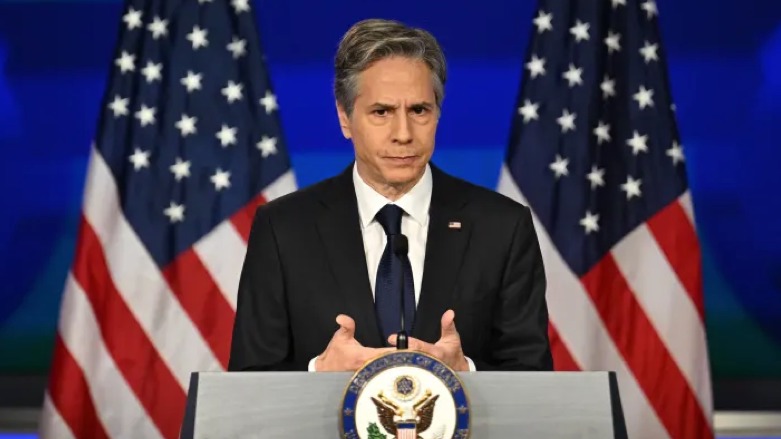Blinken: Iran has become ‘Russia’s top military backer’

WASHINGTON DC, United States (Kurdistan 24) – On Friday, US Secretary of State Antony Blinken announced new U.S. sanctions on Iran. They are largely related to Tehran’s manufacture and sale of explosive drones to Russia.
In a written press release, Blinken expressed his strongest criticism of Iran to date: “Iran has become Russia’s top military backer.”
One implication of such a statement is to underscore the point that U.S. efforts to revive the Obama-era Iranian nuclear accord have ended. The Biden administration no longer sees that as a reasonable objective.
This perspective is very different from that it held when it first took office in January 2021. Then, the Biden administration regarded Iran as the victim of an aggressive, heavy-handed Trump administration policy. Hence, its keenness to restore the 2015 nuclear accord, formally known as the Joint Comprehensive Plan of Action (JCPOA), which Donald Trump left in 2018. But that is no longer the case.
Historical Precedents to Ukraine War
Russia’s unprovoked assault on Ukraine has become the top national security concern of the Western democracies, including the US, Canada, and Europe. It revives aspects of the Cold War, in which the rivalry between the US and Russia dominated—and polarized—international politics.
It also revives memories of the start of World War II, when Adolph Hitler, in the name of protecting German speakers in central Europe, demanded territorial concessions, which he was granted, but which, as it proved, only encouraged German aggression.
Some 50 million people died during World War II, and US President Joe Biden is determined not to be a second Neville Chamberlain—the British Prime Minister who notoriously announced in 1938 that he had achieved “peace for our time,” by pressing Czechoslovakia to cede the German-speaking Sudetenland to Hitler. Within the year, however, Hitler attacked Poland, and the mind-boggling slaughter began.
Washington Post columnist, George Will, citing Yale historian, Timothy Snyder, has described the charges that Russian President Vladimir Putin has leveled against Ukraine to justify his invasion as so closely resembling those that Hitler made in his time, that they constitute “plagiarism.”
JCPOA is No Longer Viable
Thus, Tehran’s supply of a crucial weapons system—explosive drones—to Russia for use in its war on Ukraine is a major concern for the Biden administration. Along with the ongoing protests in Iran, as well as Tehran’s foot-dragging in the JCPOA negotiations, the Iranian nuclear deal is sunk.
One might have thought this issue was settled some two weeks ago, when a video emerged of Biden, on the campaign trail, telling an Iranian-American woman that the nuclear deal was “dead.”
Read More: Joe Biden: Iranian nuclear deal is 'dead'
But for two successive days this week—on Tuesday and Wednesday—journalists pressed State Department Spokesperson Ned Price as to why the US had not picked up on recent Iranian suggestions that it was still possible to negotiate a return to the JCPOA.
Those reporters suffered from tunnel vision because they failed to recognize and understand a fundamental change of circumstances. They were so narrowly focused on the JCPOA that they did not see the war in Ukraine, nor hear Ukrainian President Volodymyr Zelensky consistent description of the death and destruction that the drones—supplied to Russia by Iran—rained down on his country.
Indeed, when Zelensky visited Washington last month, he told the US Congress, “Iranian deadly drones sent to Russia” have become “a threat to our critical infrastructure.”
Read More: Zelensky slams Iran for drone sales to Russia, as he is warmly welcomed in Washington
On Monday, Zelensky published an open letter, describing the intensity of the drone threat. “Only two days have passed since the beginning of the year, and the number of Iranian drones shot down over Ukraine is already more than 80,” he said.
“This number may increase in the near future,” he continued. “We have information that Russia is planning a prolonged attack with the [Iranian] Shahids.
Thus, on Wednesday, as reporters pressed Price as to why the US did not respond to recent Iranian suggestions that the JCPOA talks could be renewed, he responded, “the Iranians have given us no reason to put any stock or faith into the statements that they have made.”
New Sanctions for Iranian Supply of UAVs to Russia
On Friday, the US announced new sanctions on Iran for its sale of drones to Russia.
The sanctions target seven individuals, six of whom are senior executives in Qods Aviation Industries, which produces the drones. A seventh person is a senior official in Iran’s Aerospace Industries Organization, which oversees the country’s ballistic missile program.
“Iran must cease its support for Russia’s unprovoked war of aggression in Ukraine,” Blinken stated, in announcing the new sanctions. “We will continue to use every tool at our disposal to disrupt and delay these transfers and impose costs on actors engaged in this activity.”
